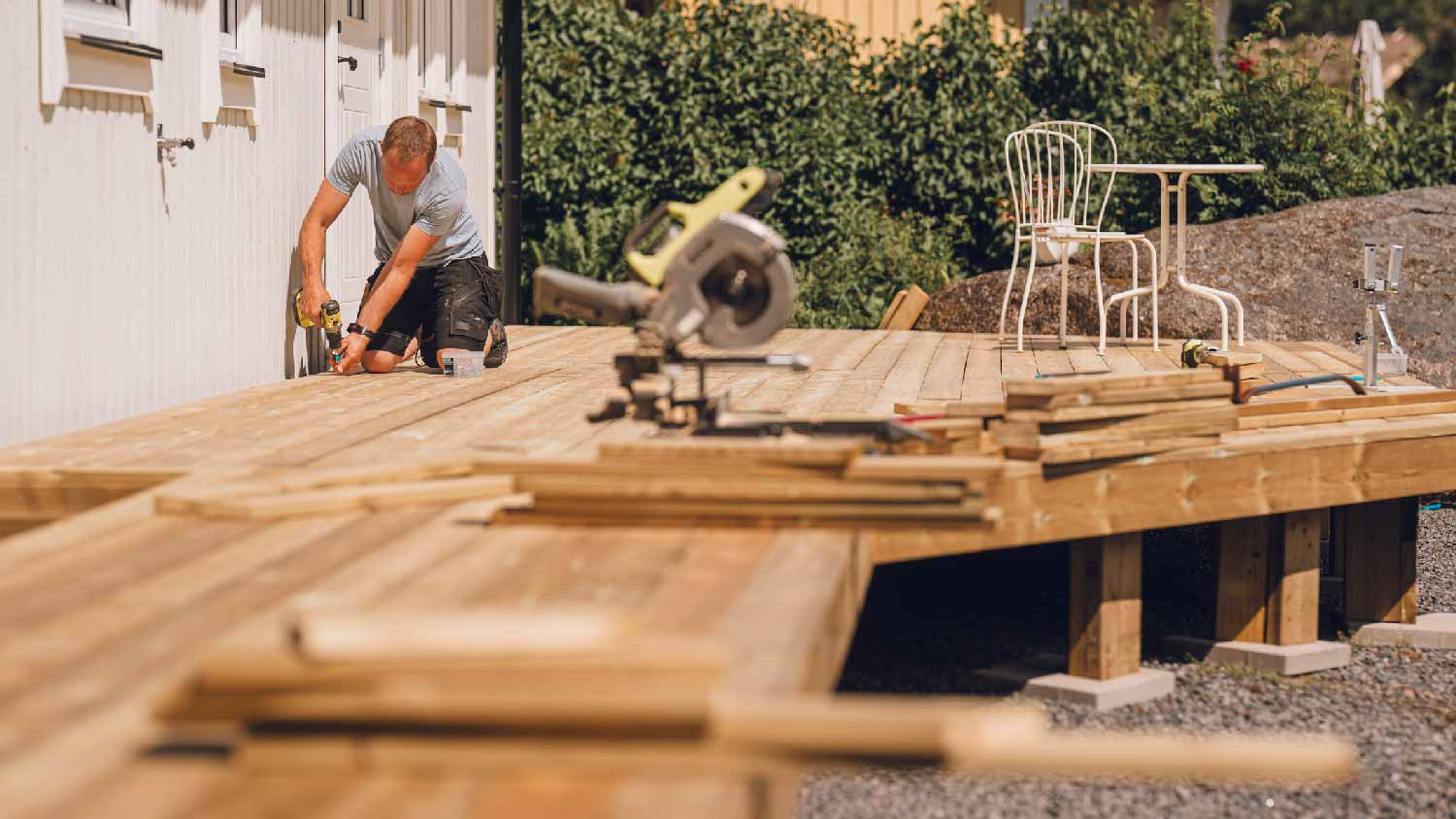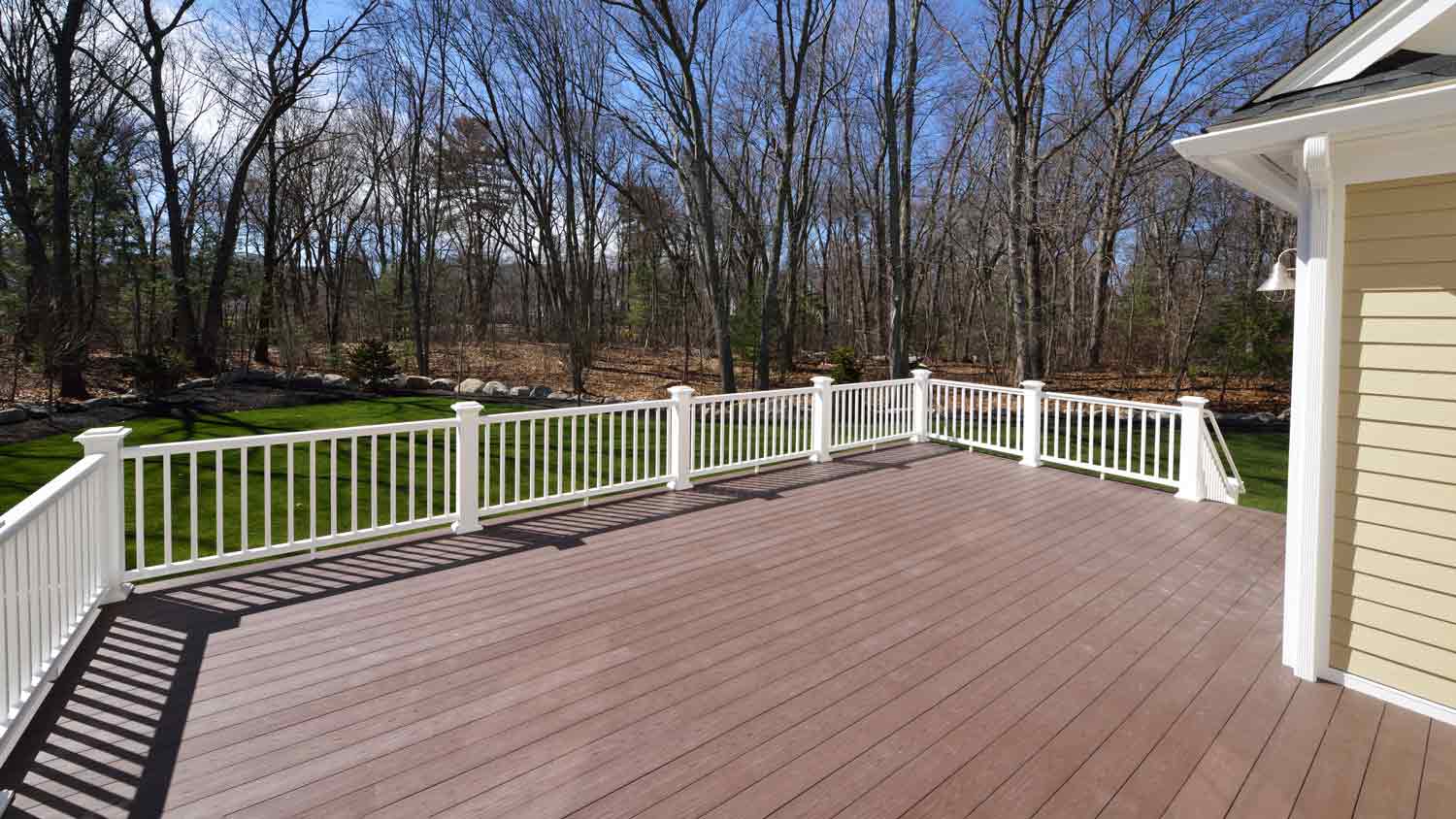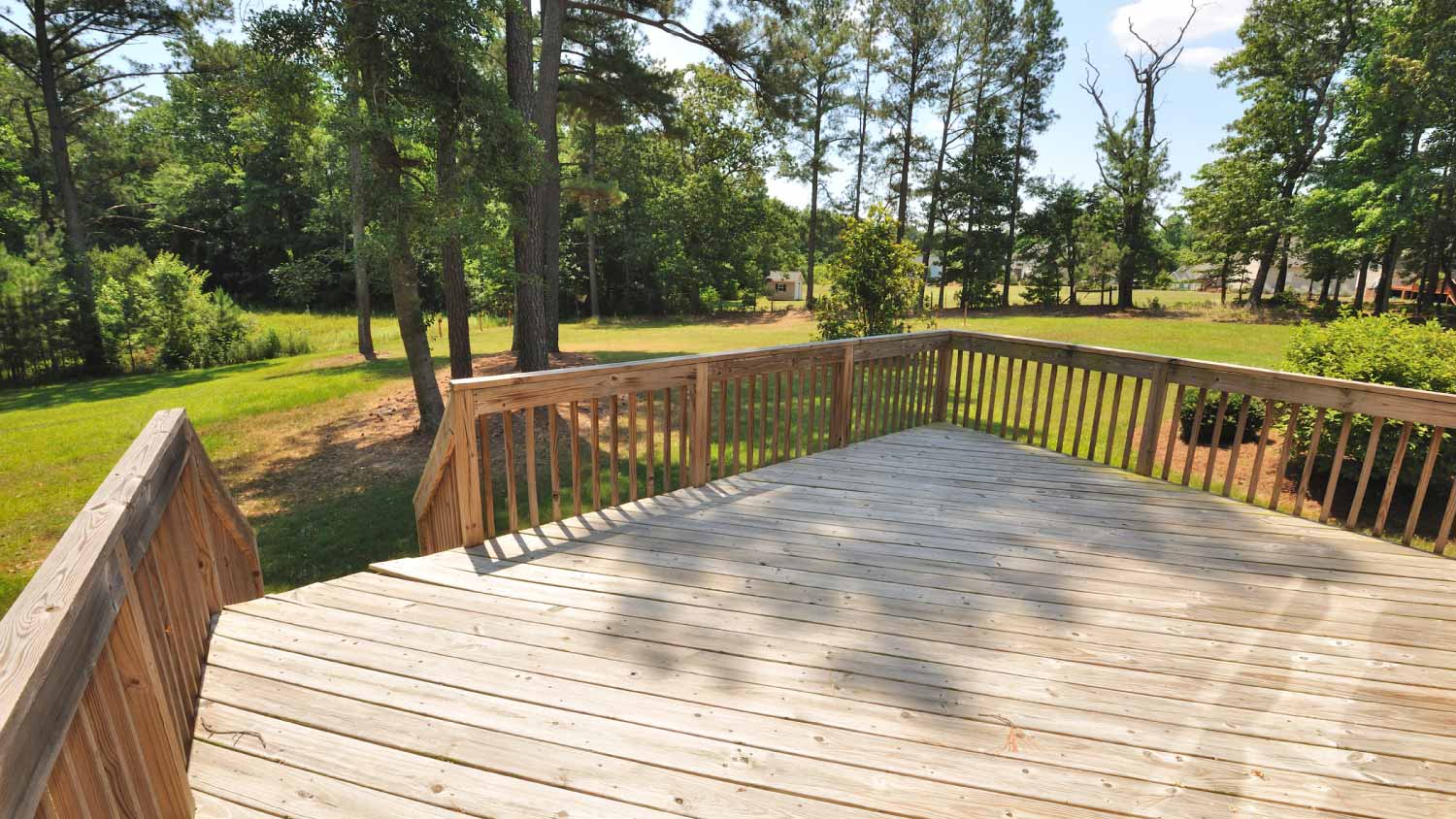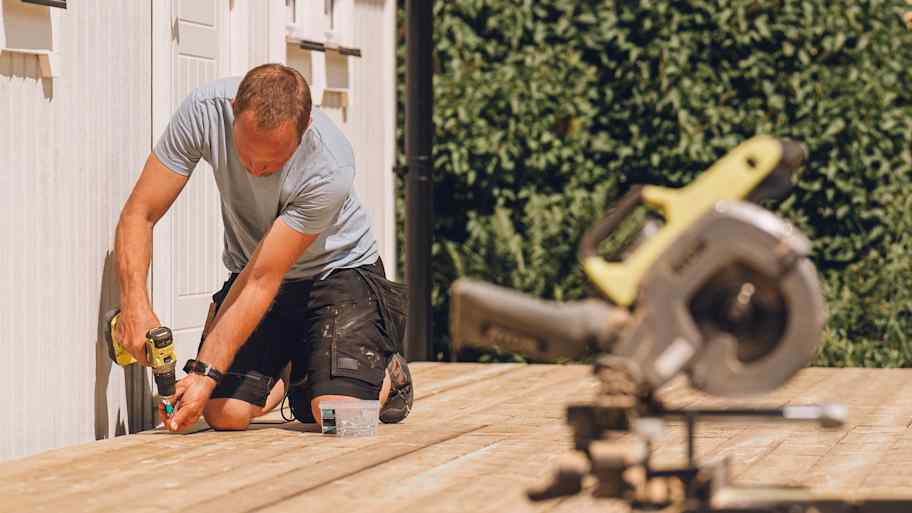
Ipe decking costs vary based on size, construction, finish, and whether you hire a professional. Learn more about how to budget for this project.
Deck your home out with this value-adding project


Home Value Rating: 3/5
Building a deck yields moderate returns that you can maximize with the help of a pro.
The average return on investment (ROI) for a deck addition is 83%, adding around $3,620 to $10,450 in resale value.
The deck size, material, location, and quality will affect the total added value of this project.
A well-built and carefully designed deck can add a comfortable outdoor living space to your home and improve summer living. Building a new deck has an average ROI of 83%, totaling around $3,620 to $10,450 in additional value based on the average project cost.
Building a deck has numerous benefits. It provides extra space for entertaining during the warmer months and a place to relax in the sunshine with a cup of coffee. The added value of a deck depends on your location, the deck size and material, and more. Learn more about the value a deck can add to your home so you can decide whether you want to take on this home improvement project.
Not all decks add the same resale value to every home. Before building a deck, consider the following factors.
If you live in a region that experiences year-round warm weather, the additional outdoor living space can be a huge selling point for your home. Conversely, if your home lacks a deck, buyers may be put off since it limits their outdoor recreational opportunities. Homes in regions with consistently cool or wet weather may not see as much ROI from a deck.
A small deck on a large house might not add as much value as a moderately sized one. Alternatively, an oversized deck that takes up most of your backyard’s real estate might have a lower return on investment than one that leaves room in your yard for other activities, like gardening or playing.
Consider how much space you need on the deck for entertaining, dining, and relaxing. If you’re concerned about the cost of adding a deck, opting for a well-designed, smaller deck might give you the most significant ROI.
Pressure-treated lumber is the most affordable deck material, but it’s more susceptible to weather and moisture damage than aluminum or composite decking. Composite decking is much pricier but requires less upkeep, which might make it more attractive to potential homebuyers.
Here are some of the most popular decking materials and their average boost to home value.
| Decking Material | Average Boost to Home Value |
|---|---|
| Pressure-treated wood | $3,350–$9,950 |
| Composite | $4,500–$9,550 |
| Vinyl | $350–$4,350 |
| Ipe wood | $9,950–$15,950 |
| Cedar | $3,000–$7,500 |
| Trex | $1,550–$8,000 |
If you want to maximize your deck’s return on investment, having a deck builder near you construct it for you is worth the cost. Unless you have professional deck-building experience, a DIY job can lead to poor crafting and a lower-quality deck (or even a structurally unsafe one that might not pass a home inspection). Homebuyers may find a DIY deck off-putting and be less likely to make an offer on your home—or, if they do make an offer, it might be lower than you’d like.
A well-built deck can add to a home’s curb appeal. Buyers appreciate a well-maintained exterior; an aesthetically pleasing deck can help your home stand out from others in your neighborhood. This can be especially important in a buyer’s market, where your home might be overlooked if your deck is old, worn, or unkempt.
.jpeg?impolicy=leadImage)
It’s hard to say the exact value a deck will add to your home, but you can estimate the added value to gauge how much of a return on investment you’ll see at selling time. Here’s how to estimate the added value your deck can bring to your home.
Research comparable homes: Look up recent home sales in your area that are of a similar size with a similar deck. Note their selling prices to get a ballpark estimate of how much you could expect to sell your home for.
Consider market demand: If most of the homes in your neighborhood have decks, your home’s value could dip significantly if you don’t.
Calculate the cost of building a deck against the return: Determine your total deck-building cost, including materials, labor, permits, and any other overhead costs. Compare that to your home’s potential sale price based on your neighborhood’s recent sales data to estimate your potential ROI.
Get an appraisal: A professional property appraiser will assess the current value of your home compared to its potential value after the deck addition is complete.
Building a deck costs an average of $8,250, though the price can range between $4,350 and $12,600. The deck size and design, the types of materials used, and the location of the deck build all influence the total project price. You’ll pay more for a complex deck with built-in seating and wrought iron railings than a basic, one-level deck with wooden railings—and splurging on composite decking rather than pressure-treated wood can cause your cost to skyrocket.
With an average return on investment of 83% and an average deck-building cost of $8,250, you can expect to recoup approximately $6,850 on this project.

If you live in a warm climate, you may spend much of your time at home sitting out on the deck. And when it comes time to sell the home, that deck can be an additional benefit for potential buyers.
However, building a deck is a costly project and usually requires a professional who builds decks for a living, which means paying for labor and materials. Consider your budget and whether you can afford to build a deck that will suit your home and your lifestyle. If you can only afford a small deck but want the space to host friends and family, it might be best to wait and save up to build the deck of your dreams instead.
Ultimately, the benefits of building a deck often outweigh the potential downsides. Decks provide exterior space for entertaining, relaxing, dining, and more, and many people find that they get plenty of use out of their outdoor living space. When you sell your home, a well-built, attractive deck is a benefit to potential buyers.
| Pros | Cons |
|---|---|
| Increased property value | Costly investment |
| Added outdoor living space | Significant time investment to build |
| Enhanced curb appeal | Local zoning and permit requirements may apply |
Home is the most important place on earth, which is why Angi has helped more than 150 million homeowners transform their houses into homes they adore. To help homeowners maximize the value of their investments, we gather ROI data from reputable sources, including industry reports, real estate studies, and interviews with market experts. We calculate the average resale value for projects by multiplying the ROI against the project’s average cost according to our cost data, which is sourced from thousands of real Angi customers.
Want to help us improve our data? Send us a recent project quote or home appraisal value to [email protected]. Quotes and personal information will not be shared publicly.
From average costs to expert advice, get all the answers you need to get your job done.

Ipe decking costs vary based on size, construction, finish, and whether you hire a professional. Learn more about how to budget for this project.

Are your porch columns old or simply unsightly? It might be time to refresh them. Here's a breakdown of the cost of replacing porch columns.

If you’re updating a deck or staircase with a modern railing, you may be wondering how much cable railing costs. We dive into the cost factors you need to know.

Why is my composite deck warping? There are a few key factors at play. Learn more about common problems and how to fix them to get to the bottom of it.

Deck railings keep you safe and give your deck a finished look. Here’s how to install railing posts on a deck to support strong and sturdy railings.

You’re designing your dream backyard deck when an important question crosses your mind: “How much decking do I need?”. Figure it out with this deck calculator.